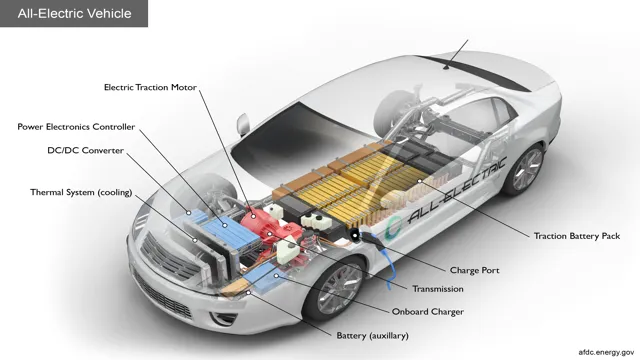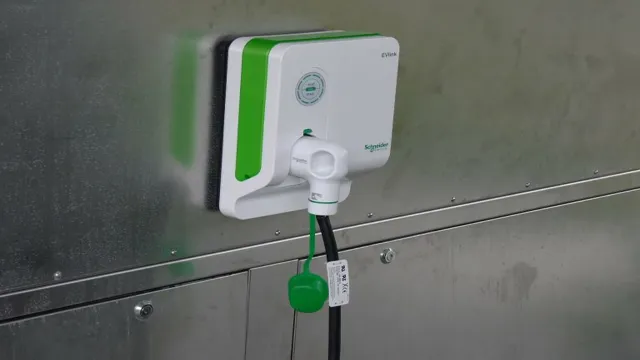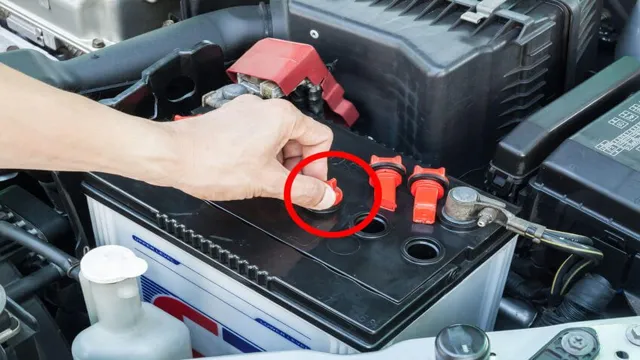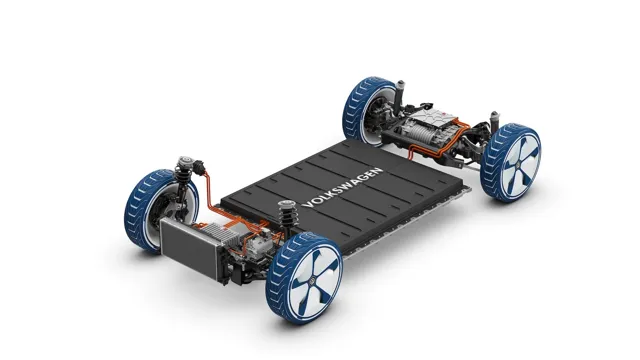Electrifying Insights: Exploring the Role of Lithium Batteries in Electric Cars
Electric cars are changing the way we think about transportation and the impact it has on the environment. With rising concerns about climate change and fossil fuels, electric vehicles are becoming more popular than ever before. But what powers these electric cars? The answer lies in lithium-ion batteries.
These batteries have been a crucial part of the electric vehicle revolution, providing the power needed to move these cars without relying on gasoline. But why are lithium-ion batteries so important? How do they work? And what are the benefits and drawbacks of using them? Let’s dive into the world of electric cars and lithium batteries to find out.
Overview of Electric Cars
Electric cars have become increasingly popular due to their sustainability and efficiency. In terms of battery technology, lithium-ion batteries are the most commonly used for electric cars, but they are not the only option. Some electric cars use nickel metal hydride (NiMH) batteries, while others are powered by solid-state batteries.
However, Lithium-ion batteries are preferred due to their ability to store more energy and provide a longer driving range. It’s important to note that not every electric car requires a lithium-ion battery, but more automakers are shifting towards this technology due to its efficiency and reliability. So, while they are not required, it is likely that the majority of new electric car models will be equipped with lithium-ion batteries.
What is an electric car?
An electric car is a vehicle that is powered by electricity rather than gasoline or diesel fuel. Instead of a traditional combustion engine, an electric car uses an electric motor to generate power, which is stored in a battery pack. Electric cars are becoming increasingly popular due to their energy efficiency and environmental friendliness, as they emit fewer greenhouse gases than traditional cars.
They are also much quieter and require less maintenance because they have fewer moving parts. However, one downside is that their driving range is typically shorter than that of traditional cars, meaning they need to be recharged more frequently. Overall, electric cars are an exciting and innovative technology that has the potential to revolutionize the way we travel and reduce our impact on the environment.
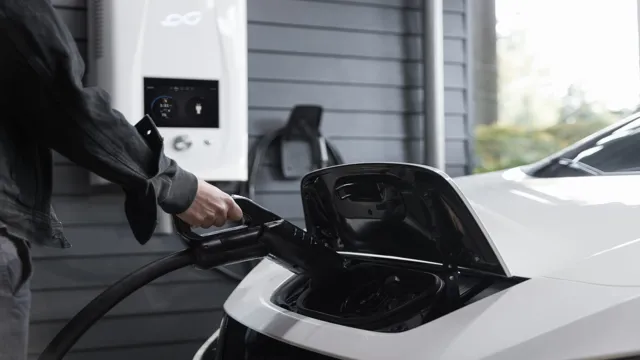
Types of electric cars
Electric cars are becoming increasingly popular due to their eco-friendly nature. Essentially, electric vehicles (EVs) are powered by an electric motor rather than an internal combustion engine. There are three types of EVs: Battery Electric Vehicles (BEVs), Plug-In Hybrid Electric Vehicles (PHEVs), and Hybrid Electric Vehicles (HEVs).
BEVs run exclusively on electric power, using rechargeable lithium-ion batteries to store electricity. PHEVs, on the other hand, can operate on both electric power and gasoline. They have a smaller battery than BEVs, but can still drive for a certain distance on electricity alone before switching to gas.
Lastly, HEVs have both a gas engine and an electric motor, with the latter providing additional power to reduce fuel consumption. These cars do not have to be plugged in, as they rely on energy captured through regenerative braking to recharge the battery. Overall, each type of electric car has its unique advantages and disadvantages depending on individual needs, making it important to research and compare models before making a final decision.
Lithium Batteries Explained
Do all electric cars require a lithium battery? The short answer is no, not all electric cars use a lithium battery. While lithium-ion batteries are the most commonly used type of battery in electric cars, there are other options available. However, it is worth noting that the vast majority of electric vehicles sold today use lithium batteries due to their high energy density, which allows for a longer driving range on a single charge.
Additionally, lithium batteries are lightweight and durable, making them an ideal choice for electric cars. While electric car manufacturers may opt to use different types of batteries, it is likely that lithium batteries will continue to dominate the market in the near future. So when it comes to electric cars, it’s safe to say that while not all of them require a lithium battery, most of them do.
What is a lithium battery?
A lithium battery is a type of rechargeable battery that uses lithium as its active material. Unlike other types of batteries, lithium batteries have a higher energy density which means they can store more energy in a smaller space. This makes them popular for use in devices such as smartphones and laptops where space is limited.
They also have a longer lifespan and can withstand a high number of charge and discharge cycles without losing their effectiveness. However, it’s important to note that lithium batteries can be dangerous if they are not handled properly. They are prone to overheating and can explode if they are damaged or subjected to extreme conditions.
Overall, lithium batteries are a reliable and efficient power source that are widely used in our daily lives.
Advantages of lithium batteries
Lithium batteries are a popular type of rechargeable battery that offer several advantages over other battery types. They are known for their lightweight design and high energy density, making them an ideal choice for portable electronic devices. In addition, lithium batteries have a longer lifespan than other types of batteries, which means they can be used for a longer period of time before needing to be replaced.
Another advantage of lithium batteries is their ability to perform well in extreme temperatures. They are designed to function in both high and low temperatures without compromising their performance, making them suitable for use in various environments. Additionally, lithium batteries are known for their high charging efficiency and low self-discharge rate, which means they can be charged quickly and retain their charge for longer periods of time.
Overall, the advantages of lithium batteries make them a popular choice for a wide range of applications. They are reliable, efficient, and long-lasting, making them the ideal choice for powering various electronic devices, from smartphones to electric cars. So if you’re looking for a reliable and long-lasting battery solution, consider investing in a lithium battery for your next electronic device.
Disadvantages of lithium batteries
Lithium batteries have been gaining popularity among consumers due to their high energy density and longer lifespan. However, there are also disadvantages to lithium batteries that consumers should be aware of before making a purchase. One major drawback is the risk of overheating, which can lead to fires or explosions if the battery is not properly maintained or manufactured with high quality materials.
Another disadvantage is their high cost compared to other battery types. Additionally, lithium batteries have a limited capacity for charging and discharging cycles, which means they will eventually lose their ability to hold a charge over time. Despite these disadvantages, lithium batteries are still widely used in many electronic devices and are a good choice for individuals who prioritize performance and longevity over cost.
Electric Cars and Battery Types
“Do all electric cars require a lithium battery?” is a common question among people interested in electric vehicles. While lithium-ion batteries are currently the most popular choice for electric vehicles, there are other types of batteries that can be used as well. Nickel-metal hydride batteries were commonly used in earlier models of hybrid vehicles, and some electric cars still use them today.
Sodium-ion batteries have also been researched as a potential alternative to lithium-ion batteries, with some promising results. However, when it comes to pure electric vehicles, lithium-ion batteries still offer the best combination of energy density, capacity, and affordability. So while not all electric cars require a lithium battery, it is currently the most practical and reliable option for most manufacturers and consumers.
Do all electric cars require a lithium battery?
Lithium batteries are the most common type of battery used in electric cars, but they are not the only option. Some electric cars use other types of batteries, such as nickel-metal hydride or solid-state batteries. Lithium batteries are popular because they have a high energy density, which means they can store a lot of energy in a relatively small, lightweight package.
They also have a long lifespan and can be recharged quickly, making them ideal for electric cars. However, some electric car manufacturers are exploring other battery technologies that may offer even better performance, such as solid-state batteries that can offer higher energy density and faster charging times. Ultimately, the type of battery used in an electric car will depend on a range of factors, including performance, cost, and availability.
So while lithium batteries are the most common choice for now, we may see other types of batteries becoming more prevalent in the future.
Alternative batteries used in electric cars
Electric cars have become increasingly popular due to their eco-friendly nature and ability to reduce carbon emissions. The battery used in an electric car is a crucial component as it stores the required energy for the vehicle to run. While most vehicles use lithium-ion batteries, several alternative battery types are available on the market.
One popular option is the Nickel Metal Hydride (NiMH) battery, known for being reliable and long-lasting. Another option is the Solid-State battery, which is still under development but boasts of having a higher energy density than lithium-ion batteries, thus increasing vehicle range. Zinc-air batteries are also used in electric vehicles, offering high energy density and low cost while being environmentally friendly.
As technology continues to improve, more innovative and sustainable battery types are likely to become available for electric cars, further advancing the eco-friendly automobile movement.
Conclusion
In the world of electric cars, lithium batteries are definitely the popular kid in school. While not all electric cars require lithium batteries, these power sources have proven themselves to be reliable, long-lasting, and environmentally friendly. Plus, they’re always first in line for the most stylish outfits.
So while some electric cars may opt for alternate battery types, it’s safe to say that lithium batteries have solidified their place as the coolest kids on the block.”
FAQs
What type of battery do most electric cars use?
Most electric cars use lithium-ion batteries.
Are there any electric cars that do not require a lithium battery?
Yes, there are some electric cars on the market that use alternative battery technologies, such as hydrogen fuel cells.
What are the benefits of using a lithium battery in an electric car?
Lithium batteries are lightweight, high-energy-density, and have a long cycle life, making them an ideal choice for electric cars.
Is a lithium battery the only option for an electric car?
While lithium batteries are currently the most popular choice for electric cars, there are alternative battery technologies under development, such as solid-state batteries, that may become viable options in the future.

